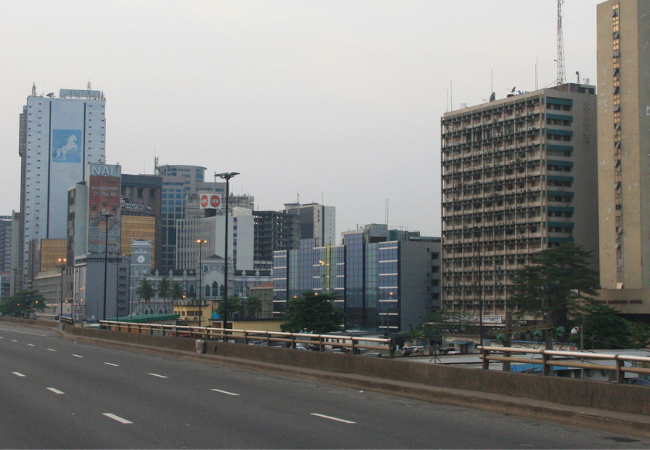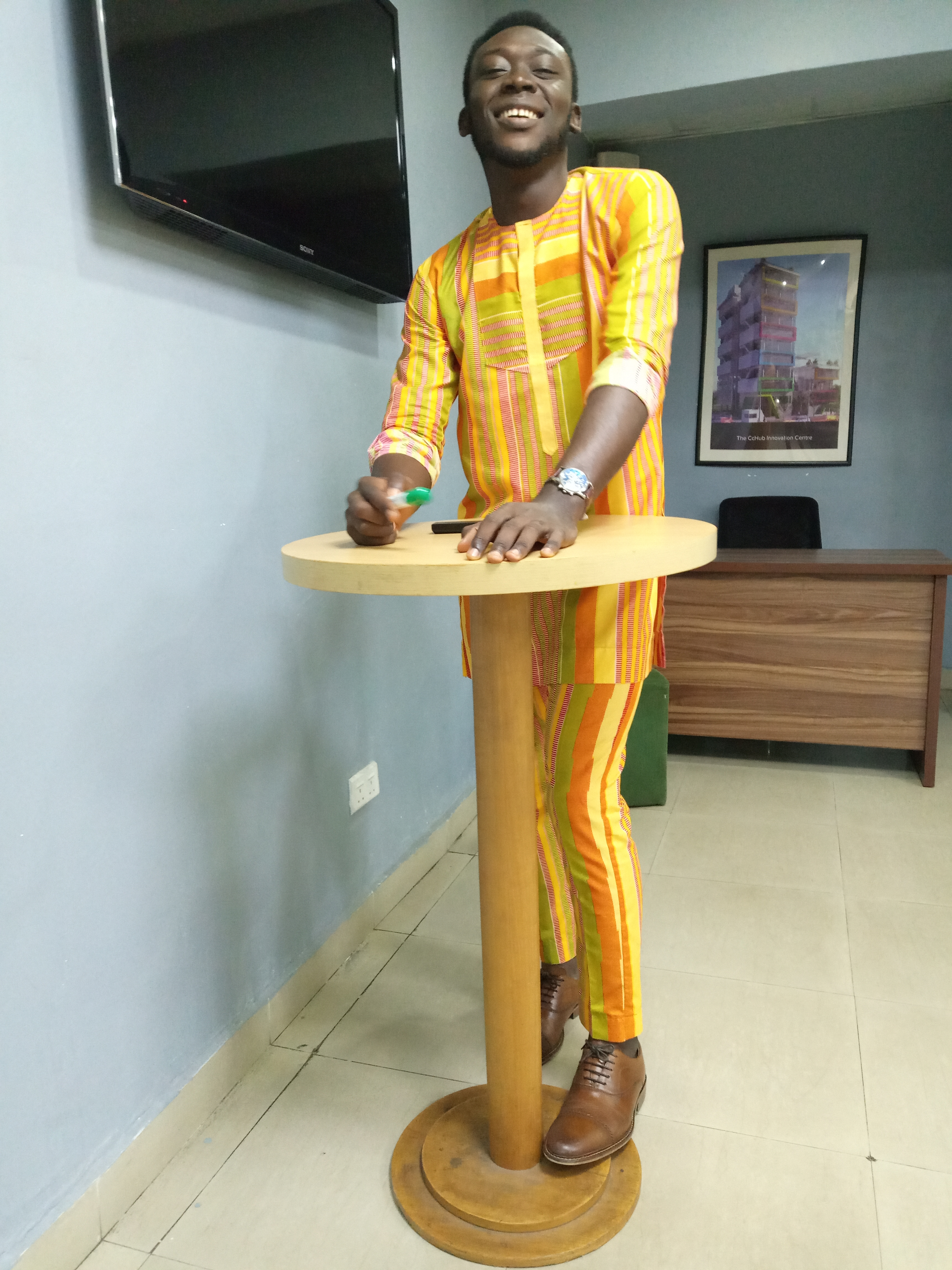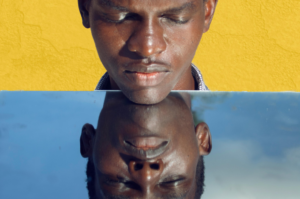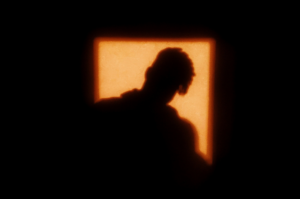
“It’s becoming too dangerous,” Laila said with a pardonable expression of fear.
For a minute she sat stone silent, regal in a blue and orange, polka-dotted ankara gown, coffee steaming off the mug in her hands.
She took a long draught of the liquid, eyes staring over the rim at her daughter.
“We are running, Laila” she said firmly, setting the mug aside.
***
Bello watched his passenger on the rear-view as they drove away from the Ibeju International Airport, shooting occasional glances at the briefcase sitting next to him, the Moroccan’s eyes fixed on the sights easing past them.
In a gruff voice he had introduced himself simply as “Youssef,” saying nothing else. And those pair of deep-set, green eyes and the coarse, brutish build made Bello think the jet-black tuxedos Youssef wore looked out of place on him.
“First time in Nigeria?” He asked the Moroccan to break the wall of silence
“Yes.” he said, staring far into the fumes rising from the Dangote refinery.
Speeding past an enormous, blue tower, “Solo Inc.” written across, Youssef looked with recognition: he owned a robot by the $12.7 billion Nigerian tech company rivalling Google in the African market. Other buildings followed: “Tesla,” “Warner Bros,” “Tiffany Amber,” “Flutterwave,” “Marvel Studios”… written across.
Capital Street was their hub; an opulent highway lavish with towers and skyscrapers, stretching four kilometers from the airport to Lagos Island; the point where the opulence and calm of the Island greets the sizzles, bustles and neglect of the Mainland. It is often said that if all the businesses in Nigeria were together worth a trillion dollars, then Capital Street knows at least where $900b of that money is.
They drove through a flood-lit subway tunnel that rose steeply unto Fourth Mainland Bridge, continuing a further 12 minutes on it before emptying into one of a six-way road channel. In the middle of the roads were two train tracks, and two trains soon breezed past them, lightning-fast before Youssef would even catch sight of them.
Impressed.
The Uber driver grinned, seizing occasion to look at Youssef’s briefcase on the rear-view again.
“There is a real reason why Lagos is called the capital of Africa,” he said with a proud smile, his words accented heavily with Yoruba. “It is a place for everybody. Companies operating only in America and Europe before, have three to five outlets in Lagos alone now. Everybody wants to do business in Lagos, especially these tech people.
“See,” pointing outside at some low-flying drones in the sky. “That is for surveillance. A 16-year old boy at Andela designed them.”
Youssef barely looked out, scarcely interested, sitting silently on.
“Is it enough to watch this city?” he said finally.
“Hahaha,” Bello chortled, relieved the man was speaking again “Oga, everybody is a watchman in Lagos Sir—for your own safety…hahaha,” he laughed all too loudly while stealing a glance or two off Youssef’s briefcase.
At the Teslim Balogun stadium they met with a line of over a thousand people in white shirts, faces plastered boldly over them; men, women and poster-bearing school children all chanting;
Mummy Eko!
Mummy Funsho o!
Mummy Eko!
Na Funsho Clark we know!
“Vote Funsho Clark as President 2031” was written boldly over the placards and posters they hoisted proudly over their heads like wealth. Youssef sat up, watching the lines of vehicles and people go on and on.
“The RDP’s primaries holds tonight,” Bello explained, seeing the flash of interest in Youssef’s eyes. “Presidential election is in 6 months.” He looked at the briefcase.
They went on for four or five minutes, silent again before Youssef barked a command: “Pull over.”
“Jibowu? This is Jibowu not yet Ikeja. Your destination is still ah…”
“Pull over.” he said firmly and gruffly without even raising his voice.
Obediently, Bello stopped by a kerb, turning to know why but Youssef handed him his N9,000 and stepped out, pulling his briefcase behind him.
Bello watched him walk away gently, fiddling on his phone. The Moroccan found a quiet spot under the hood of a bus stop, waited a few minutes there, two or three calls between before a silver-coloured Nissan Altima pulled over in front of him, into which he hastily climbed.
Bello watched the car depart, leaving a good distance between them before he turned on his engine and drove away.
***
Welcome from that music break. And now, back to the big talk for tonight. The RDP’s primaries holds today from 9pm—which is now only 25 minutes away.
We have had from inside sources that this is almost set to be a walkaway victory for Funsho Clark, as she has pulled some very strong weight within the party.
Now, are what we’ve been seeing thus far, signs that Nigeria is ready for her first ever female President?
Call or send in your thoughts to 090201892…
Tolu Demuren’s voice continued over the radio as Bello sat focused, following movements in the car ahead, back to the same spot where he had dropped Youssef three hours earlier. Thoughts to call his wife tugged insistently at him but he decided against it.
From the dashboard, Seyi’s face smiled weakly at him as if to discourage her father from what he was about to do. He took a longer consideration looking at her face and almost reached for his phone to put a call through to her when the car ahead began driving off.
Turning off the radio, he parked and started walking behind the huge figure in black, a crowd buzzing in the distance where he was walking into. He followed, past a few white shirts and teenage boys puffing weed, into the flood-lit and teeming entrance of the Teslim Balogun stadium, the gate fully manned by police vans and armed men.
No, Bello cried, losing sight of Youssef in the horde. He looked up and across the road without catching sight of him, sweaty men and women yanking him into their little groups here and there. He managed to stay on his feet as he walked through, still no sight of the Moroccan.
Funsho Clark’s erudite voice boomed from the stadium’s speakers and the crowd went amok, women and children jumping in a fit of tumultuous frenzy, chants and singing going up in the air. The presidential hopeful tried forlornly to calm them, but even they inside the stadium were having none of it.
THERE! across the road. Bello knew him instantly by his gait, breaking immediately into a chase behind Youssef. He made his way into a dark building on the other side, leaving Bello wondering how he had no idea what went on in there having plied this route everyday in his almost eight years since retirement.
Too dangerous, he thought as Youssef disappeared through a door, the entire building grim as it was dark.
Receding, with one eye on the building, he ran back towards the stadium.
In a dark room upstairs, Youssef gloved his hands, opened his briefcase and, piece by piece, built back his DAN.338 sniper rifle. When it stood erect and complete, he set it down on the empty floor, taking aim at the stage, 0.72km away.
It didn’t take a minute before her face came on the optics of his rifle, disappearing quickly again. Too many people. He found her again and this time she remained, circling the target on her head, allowing a few centimeters of drifting to the right and left as Funsho Clark carries on pepping up the delegates with her speech.
She came on clear on his lens and then he worked his index finger firmly unto the trigger; his shot would leave no piece of her.
He heard footsteps gathering at his door but he refused to be interrupted, his shot only a hair away.
She said something just then and began moving about animatedly to accentuate her point, the target burping about restlessly on his lens.
“Fuck!” he cursed low under his breath, the sound of people gathering at the door becoming a concern. He stood away from the rifle, exasperated, reached in his briefcase for a revolver and a silencer, and walked over to the door.
Seven policemen, he counted, installing the silencer—and the Driver? He peered closely through to make sure. He confirmed it was indeed Bello. Not surprised.
Gba! gba! gba! A policeman knocked, “This is the Nigerian Police…We have….”
Peum, Peum, Peum… he interrupted the annunciation with shots through the escutcheon, gunning five of the policemen down. The others and Bello tucked to the side.
Youssef edged himself, picking sight of a shoulder and a leg. A bullet from him brought the owner of the shoulder full in view and another sent him yelping to the ground. He was heaving in for the leg when a scary sound accompanied bullets to his door
Kpa-da!-Kpa!-Kpa! Kpata-Kpa-Kpa A policeman shot aimlessly at the door, running up the staircase. A bullet caught Youssef in the neck, but he shot his shooter before he started feeling the sting and bite spread. The two other policemen threw all caution out the window and came all out to avenge their colleagues. He espied Bello running back down the stairs and sent a bullet through his head, effectively making sure he was seeing the last of the man—but a bullet caught him also in the chest, sending him falling backwards.
He dragged himself to the window, towards his rifle.
Funsho Clark was distinct and steady but fuzzy at the same time as blood oozed uncontrollably from his heart. He found a way to the trigger—
“Haai!!” A policeman yelped in pain, bringing down what was left of the door with the bulk of his weight. He recovered quickly and rose to search for his gun in the dark room, the metal having left his grip from the impact of his butt on the ground.
More policemen were now ascending the stairs, the one in the room finally saw his gun and ran for it, breathing threats.
He released the shot, and almost as soon, picked up his revolver, and, placing it under his throat, sent a bullet through.
***
There were only two black jeeps, but it summoned the entire Akoko village to the compound.
“Your father was a brave man.” She was saying to the teenage girl, stroking her hair.
“He died a patriot of this great country. Retired, yes; but he remained a defender at heart. And this makes me more conscious of my responsibility, Seyi. Whatever I do, I keep in mind that I owe people like your father and my mother, service without any jot of excuse, and beyond condolence, this is what I have come to assure you and your mum. Your father will always be in our hearts. He is a hero of our democracy today,” she told her.
Seyi nodded, tearful yet befuddled by the President’s presence.
“Take care of mummy, okay? I shall see you both in Abuja when her time of mourning here is over.”
Patting the girl tenderly on her shoulder before stepping out of the compound.
Outside, the gathered villagers who had stood waiting endlessly confirmed the visitor in their midst and a round of jumping and chanting went about: Mummy! Mummy! Mummy!
She knew she would never get used to that.
Her mom had not even lived to become President, yet she had left some big shoes to fill in there.
She waved at them, poised and tearful, her face making a survey over their heads like a man drinking sight of home for the last time before he should die, before she climbed into the car.
There was work to be done.
About the Writer:
 Y’I Oche is a Digital Security Analyst by day and a literary writer at sundown. In the eight years since his first foray into writing, he has completed three drafts for a fantasy novel, a story which looks at the life of the first Man and Woman, their struggle with Angels and the persistent haunt of an act of infidelity that continues 13,000 years, resurfacing fully in the life of their only descendant in the Age of the Custodians, who, in his quest for meaning and a bride, realizes he is only a pawn in an ongoing battle between his ancestors and some fallen angels. Oche has written some 25+ short stories in this time, and “2031” is the first he is sharing with the world for the similarities he sees with events leading up to the 2019 general elections in Nigeria, and his prediction for the future.
Y’I Oche is a Digital Security Analyst by day and a literary writer at sundown. In the eight years since his first foray into writing, he has completed three drafts for a fantasy novel, a story which looks at the life of the first Man and Woman, their struggle with Angels and the persistent haunt of an act of infidelity that continues 13,000 years, resurfacing fully in the life of their only descendant in the Age of the Custodians, who, in his quest for meaning and a bride, realizes he is only a pawn in an ongoing battle between his ancestors and some fallen angels. Oche has written some 25+ short stories in this time, and “2031” is the first he is sharing with the world for the similarities he sees with events leading up to the 2019 general elections in Nigeria, and his prediction for the future.









Rita June 11, 2023 12:49
Nice one!! But Bello didn’t have to die